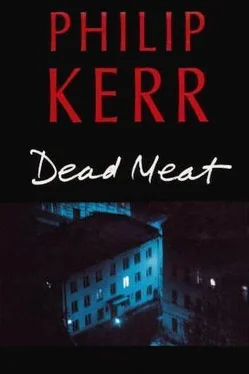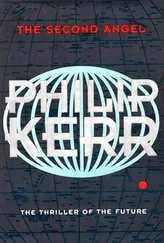Vera Andreyeva picked up a smart new pigskin briefcase and took out a copy of Ogonyok . On the front cover was a picture of Milyukin.
‘You know, a lot of people in this Department admired Milyukin,’ she said. ‘Myself included.’
‘But you’re leaving,’ said Grushko. ‘It wouldn’t be the first time that this Department has got rid of its liberals.’
‘Half the KGB is going to be looking for a new job,’ she said insistently. ‘It’s not politics that runs the system now. It’s the International Monetary Fund.’
‘You’d know more about that than I do.’ He picked up the box containing the information on Mikhail Milyukin and walked to the door.
‘Thanks for this,’ he said. ‘And good luck with the hamburgers.’
‘Promise me you’ll think it over,’ she said.
Grushko nodded.
‘I promise,’ he said. ‘But if unemployment is set for a big rise then that’s good news for the Mafia. The way things are shaping up Petersburg will be just like Chicago in the twenties.’ He grinned. ‘And it’s not much of a story if there’s no Elliot Ness.’
It was while I was leaving the synagogue on Lermontovsky Prospekt after the service for her husband that I first saw the beauty of Nina Milyukin. Taller by a head than the friends and relations surrounding her, she stood waiting for the cars to take us down to Volkov Cemetery, without tears but with such a look of sadness as I had never seen. Before I had thought her face merely clever. Now she struck me as something more distinguished, aristocratic even, like some long-lost Romanov princess from that old tragedy. These are odd words for a lawyer but they must be said, for this is not only Grushko’s story, it is also mine.
I do not know whether Grushko made it to the synagogue or not, as I did not actually see him until the funeral party arrived at the cemetery, which was not surprising given the large number of people, many of them Milyukin’s readers, who had turned up to pay their respects to him. Even the Mayor of St Petersburg was there, his office having given permission for Milyukin’s burial in one of the city’s oldest and most exclusive cemeteries, where some of the country’s best writers — Belinsky, Blok, Turgenev and Kuprin — were buried.
The funeral could not have been more different from the Georgian’s. The State’s contribution of 100 roubles was as nothing compared to the cost of the cheapest coffin: at 2,000 roubles apiece these were hard to find and, but for a whip-round in the Big House organised by Grushko, Nina Milyukin might easily have been forced to hire a coffin for the trip to Volkov Cemetery and then to transfer her husband’s body to a plastic bag for the actual burial. None of the cars, with the possible exception of the mayor’s Zil, would have excited much interest. Nor were there any enormous wreaths, only single carnations. But there was no mistaking the sense of real grief that affected everyone who was there that warm June afternoon.
Afterwards, as the crowds drifted slowly away, Nina remained standing by her husband’s grave and watched as the gravediggers began to fill it in.
Grushko spoke to Nikolai, Sasha and myself.
‘Wait in the car,’ he told us. ‘I’m going to try and have a word with her. If she is holding back on us then now’s the time to squeeze her.’
To me this seemed insensitive of him but I said nothing until the three of us were back in the car.
‘How can he do that?’ I asked. ‘Surely she has the right to a little privacy at her husband’s funeral?’
Nikolai pointed to the television crew that had covered the event and were now loading their equipment back into a van.
‘What privacy?’ he said.
‘No, he’s right,’ said Sasha. ‘Grushko can be a hard bastard sometimes.’
Nikolai pursed his lips and lit a cigarette.
‘I’ll tell you something,’ he said. ‘I never met a fairer cop. Not anywhere. If he said he thought the Patriarch himself was a crook, then I’d believe him. If Grushko thinks that she needs a squeeze, then that’s good enough for me.
‘Besides,’ he added, ‘if she’s not telling us the whole story then now’s the best time to find out. When she’s feeling vulnerable. There’s no telling how long a woman like that might give you the run-around.’
Grushko found Nina walking alone on the Poet’s Pathway.
‘May I talk to you?’
‘It’s a free country now,’ she sighed. ‘So they tell me.’
He took a deep breath and spat it out.
‘I don’t think that you’ve been entirely honest with us,’ he said. ‘Have you?’
She was silent for a moment.
Grushko repeated the question.
‘You know, Colonel, when I was younger, I used to imagine that my father was buried here. You see, he was a writer too. Not that I really knew him. I was just a baby when he was arrested. We never found out what became of him. Where or when he died. I like to think that if he had lived, he would have been good enough to come here with the rest of them.’ She smiled sadly. ‘Ironic, isn’t it? I never thought I’d ever marry a man whom they buried here. I don’t suppose it would have crossed Mikhail’s mind either.’
‘I didn’t know about your father,’ said Grushko. ‘I’m sorry. But look, things are different now.’
‘Are they?’ She shrugged. ‘I don’t know. Maybe.’
‘So how about it? Some straight answers.’
She looked up at the blue sky and Grushko saw that there were tears in her eyes.
‘You were right,’ she said. ‘When you asked about that bodyguard. Mikhail did try and hire one. But it wasn’t because he was scared of anyone in particular.’
‘I’m not sure I understand.’
‘It was more of a collective thing really. You see, Mikhail was never happy unless he was working on a story that involved a degree of risk. He was always in danger from somebody or other. He thrived on that. Despite all the threats, all that hate, he wouldn’t have changed places with anyone. As I told you before, it was beginning to get to him. But the idea of having a bodyguard seemed to be a way of helping him to cope with the pressure of what he was doing. That and his drinking. So he tried to hire one of your own police thugs: the ones they use to put down riots.’
The OMON squad?’
‘Yes. Only the man wanted too much money. That’s why I told you we couldn’t afford it. I’m afraid I was rather angry with the militia, Colonel. I was bitter at the idea that, but for a few more roubles, Mikhail might still be alive.’
‘This man from the OMON squad: do you remember his name?’
‘Georgi... Rodionov.’
Grushko made a note of the name. Nina sighed deeply and laid her hand on her chest.
‘And now if you don’t mind, I’d really like to be left alone for a while.’
While we were waiting, Iron Lenya rang from the morgue on Grushko’s car phone. There was a body she wanted us to come and have a look at. When Nikolai had finished speaking to her, Sasha groaned loudly. ‘I hate the morgue,’ he said.
Nikolai fed another cigarette into his mouth, lit it with the last one and chuckled.
‘Look on the bright side,’ he said. ‘At least it’ll take away your appetite.’
Of the two to three hundred people who died every day in St Petersburg, most were taken north-east across the River Neva, past the Piskarov Memorial where 500,000 victims of the blockade were buried, to the suitably contiguous Bureau of Juridical Medical Examinations.
It was late in the afternoon when we followed this sad trail off Piskarovksy Prospekt and on to a rough track leading down the side of the pre-Revolutionary Mechnikov Hospital. Seen from a distance, the fortress-shaped building that was the Bureau could not have looked less morbid. Sunlight warmed its pink brick and illuminated the yellow-tinted windows so that it resembled some fantastic sugar-candy palace in a children’s fairytale. Certainly there was nowhere else like it in Russia. Grushko told me that the Director, Professor Vitali Derzhavin (who was descended from the great Russian poet), claimed that only Helsinki and New York had a similarly comprehensive forensic facility. Catching my eye in his driving mirror, he added:
Читать дальше












